- Home
- Will McIntosh
City Living Page 2
City Living Read online
Page 2
When I got closer I could tell I wasn’t going to like whatever was going on behind that curtain. People were groaning, gasping, some downright shouting in pain. As a medical student I had some idea of how much pain it took to squeeze those sounds out of grown men and women, and I was sweating as the line inched along.
When it was finally my turn, I strode on back as if I did it all the time. I didn’t want to raise any suspicion. There was a doctor and a nurse on the other side, both dressed in white. The doctor held a long, long, long needle. He held it pointed at the ceiling. There was nothing in it.
“Name and number?” the nurse asked, holding a pen to a clipboard.
“John…Smith,” I said. She looked up when I didn’t immediately give her my number. Problem was, I could make up a name, but I didn’t know how long the darned number should be. I opened my mouth. “Eight. Six. Four.” I put a lot of space between them, stopping after each one and watching the nurse. “Seven. Six. Seven. Two.”
She nodded. I shut my mouth. The doctor yanked up the back of my shirt and stuck the needle into my lower back, shoving it in, moving it around like he was fishing for something in there. I ground my teeth against the pain, thinking at the same time that I knew just what they was after. The adrenal glands are right on top of the kidneys. That’s where he was poking the needle. I leaned and watched the doctor draw the plunger back, filling the syringe with adrenaline.
It all fit together. Being scared stimulated the adrenal glands to make more adrenaline. Scare sixty-two thousand people, you got yourself a whole lot of adrenaline. What I didn’t get was what you do with all that adrenaline.
“What happened to you?” Willard said when I met him outside the drugstore. I looked down at my shirt. It looked like I’d had a bucket of black paint thrown on me.
I put an arm around Willard’s shoulder, as much to steady myself as to be friendly. I was mighty shaken. “Come on, I’ll tell you about it while we walk.”
We passed that same newspaper seller. “Here,” I said, handing him the paper. “I’m done with it.”
“Thanks.” He straightened it up, put it back on the stack.
We had crossed Eleventh Avenue, and for the first time I could see it: The tops of trees passed by like we were in a river of leaves and branches. I hurried over to the edge.
It was an awesome sight, standing on the edge, gawking down through the branches at the ground thirty feet below. We passed a brave fellow standing not fifty feet from the city, staring up, his hand shielding his eyes to improve his view. Straight down, the city’s stone foundation tore into the Georgia clay, spraying out a steady stream of red dirt and stone and whatnot. We were traveling in a previously traveled track, so there was no risk of flattening anybody’s house or town. Not that cities didn’t do that on occasion, if they needed to get somewhere and there was no empty way to get there.
“Good golly,” I whispered. The locals were just walking on by, not even looking at the passing countryside. I guess they were used to it by now. Me, I could’ve stood there all day.
It took two days for New York to reach Chicago, even with the extra adrenaline squeezed out of the residents. I still couldn’t figure what to make of that.
I used the time to see the sights of the big city. I got to see way more of New York than I had expected, though mostly we were just marking time, waiting for New York to catch up to Chicago. Rumors flew all over the streets, that Boston was in flames, that Moscow had crossed into the US and attacked Chicago, instead of Chicago attacking Boston. All we knew for sure was that something bad was happening.
When news spread that we was getting close, Willard and me followed a crowd to Inwood Park, which was the front fender of this big ole truck.
The park was brimming with curiosity-seekers; I found space on the low stone edge of the city. We sat and waited, one of us occasionally using the binoculars I’d bought to watch for Chicago as forest and livestock and farmhouses rattled by.
A city woman was standing just a few feet away, her nails painted red, her high-heeled shoes shiny black. She was watching the horizon just like everyone else.
“Afternoon, ma’am,” I said, tipping my hat.
She glanced at me sideways. “Afternoon.”
I offered her the binoculars. “Care to take a look with these?”
She thanked me, and took the binoculars, and that got us to talking about this and that as we waited and watched, watched and waited. Her name was Lois—a big-city name if there ever was one. Eventually I got around to asking Lois about the points and all.
“So what happens if you don’t make your points?” I asked. Now that I understood how you got points it opened up a whole slew of mysteries.
She set the binoculars on the wall. “First you lose your electricity, then your water. Then one day you come home and someone else is living in your apartment.” Willard pulled the binoculars over to him by the strap. “It doesn’t happen often. Most people want to do their part to keep the city strong.”
I rubbed the spot above my kidney where the needle had sunk in. “It’s quite a price.”
Lois gave me one of those looks that said she felt sorry for me because I was an ignorant hick. “When your country was being threatened, weren’t you willing to fight and die for it?”
“My daddy did fight and die for it. Died on Atlanta, in France.”
“That’s how we feel about New York. I gladly take the needles. Sharing our life fluids joins us to the city.” She waved a hand in the air, looking all dreamy. “If you became a citizen, you’d understand.”
Shouts lit up the park. “Lemme see them specs,” I said to Willard, wiggling my fingers.
Willard went right on looking. “I don’t see nothing. What are they shouting about? Wait. I see something.”
We waited, looking from Willard to the open fields and back to Willard. “Well?” I said.
“I see the city, but I can’t see nothing but buildings.”
I pulled the binoculars out of his hand and took a look for myself. I couldn’t see nothing but buildings, either, but Chicago kept getting closer, and soon I could focus on one street. I could see people walking in the street—but not nearly as many as you’d expect in a big city. There were plenty of cars, parked ass to bumper down both sides of the street, but I couldn’t see who’d be driving all those cars. I could see a shoeshine stand with the rags draped on a hook, waiting, but there was no one around it.
As we got even closer, I could take a look at the people up close, and they didn’t look right at all. They were walking with their heads down, taking slow, careful steps like they was afraid they might fall down, or step in something they didn’t want on their shoes.
New York jerked to a stop. I’d gotten used to the whistling sound the air made when the city was moving, and now it felt deadly still. I offered the binoculars to Lois.
There was an awesome rumbling, like the engine of the world’s biggest motorcar coming to life. Lois nearly dropped the binoculars over the wall as Chicago leapt forward, jerking and bouncing. It headed straight for New York.
“Looks like they want to talk,” Willard said.
Lois and me didn’t answer. There was something wrong about Chicago. I wanted to get another look at those people walking the streets, but it seemed rude to ask for the binoculars back.
Chicago kept on building steam, adjusting itself a bit to the left or right to make sure it was coming right at us. It reminded me of something. I guess a city can’t look angry or crazy, but that’s what came into my head—that it was like an angry bull.
“It’s gonna run right into us!” Willard said, his hand knifed over his eyes to shade them from the glare.
The honking alarm went on, and this time I didn’t need nobody to tell me what to do. I hopped off the wall, helped Lois down, and then planted my behind on solid ground.
New York jerked to life. We waited a nickel’s worth, then got back on our feet to watch. New York cut sideways, out
of Chicago’s path, picking up speed in a hurry. Chicago swerved toward us; it was going to be a close thing.
“Have they lost their minds?” Lois asked, holding her hat so it didn’t fly off.
I gritted my teeth; if Chicago hit, it would hit right about where we were standing. It was too late to run—if it hit it would chew up this whole park and more.
People were running anyhow, as Chicago got bigger and bigger, its skyscrapers rising up over our heads. Willard took two steps. He looked at me, his face a big question mark. I shook my head. “Too late.”
New York shifted direction, digging a big curve and kicking up dirt as it wove forward, in the opposite direction from Chicago. The walls of the two cities matched up, sliding by each other like two pirate ships passing on the water. I watched the Chicago street closest to the wall, watched the people on it peering between their fingers like they was watching Frankenstein at the movies. They didn’t want the cities to collide neither.
“There’s someone on the wall,” Lois shouted, pointing.
Sure enough, there was a Chicago man balancing on the wall, his arms spread, his knees bent.
He jumped toward us, feet pedaling the air. It didn’t look like he had enough giddyup to make it. I reached out; the man just made the wall and I grabbed hold of one of his hands as he clawed at the bricks. Lois leaned out and grabbed him under one armpit. We pulled him up and over.
“Thank you, thank you,” the man babbled before he even had a chance to brush himself off. “Oh Lord, thank you.” He had a cut on his head, just over his eye, and his hands and arms were scraped bad, but he didn’t seem to notice. He turned and leaned his hands on the wall, watching Chicago retreat. “Thank you, Lord.”
“What’s going on over there, friend?” I asked, putting a hand on the man’s back, trying to calm him. His face was shaking. His hands, too, but I never seen someone so scared that his face shook.
He fixed me with a crazy stare. “Your worst nightmare, that’s what.”
“Look out! What are they doing?” Willard said, still watching over the wall. The rest of us joined him. Chicago had turned left, right into the path of a small town.
It plowed right over the town.
“Jesus, Lord,” Willard wailed.
We could hear screams mixed with crunching wood and brick as Chicago mowed down house after house. People ran, but where was there to go? It was a whole city; no one was going to outrun a city.
There was a commotion behind us; we turned to see soldiers rushing toward us, some carrying rifles, some pulling cannons.
We took the fella from Chicago, whose name was Perry, to a diner on Eighth Avenue. We offered him scotch, but he wanted tea. He was a wispy sort, skinny and small with nervous hands and a mustache that had grown in too thin, leaving spaces where the skin showed through. He didn’t want to talk about Chicago—he held the cup close to his face like he could hide behind it and kept shaking his head and saying, “You don’t want to know.”
I did want to know, so finally I reminded him that he’d be nothing but roadkill if it wasn’t for us, and that maybe he owed us an explanation.
“All right.” Perry put the cup down, leaned back on the couch. “I’ll tell you. But I don’t want to.” He closed his eyes, took a deep breath, and let it out with a wheeze. “I don’t want to think about it. I want to pretend it was a bad dream.” He looked like he was going to cry.
He collected himself, and finally started talking.
“One of the five lived in Chicago—Crowley, the conjuror. He didn’t hold any office, but he may as well have been king the way people did what he wanted. What he wanted was more life fluids for the city. He pressured Mayor Cermak into raising the requirements again and again, until we were all being siphoned on a weekly basis.”
“Oh, my,” Lois said, shaking her head.
Perry shook his head in a ‘You ain’t heard nothing yet’ way. “Then people started dying. In their bathtubs, elevators, the subway. At first it seemed like a rash of freak accidents, but then word spread that there was a detail being covered up by the coroner: the victims were dry—they’d been drained.”
Willard opened his mouth to speak, but Perry waved him silent.
“There was panic. A lot of residents would have fled, but Chicago was moving, and it kept moving. And people kept dying. More ‘accidents.’” He stopped, fixed me with a stare that dared me to hear what he was about to say. “Then the city began killing openly. Gouts of steam might come up through a grate in the sidewalk as you walked over it, boiling you alive. The corner mailbox might close on your arm and squeeze until it cut your arm right off—”
“Stop it!” Lois leapt to her feet. “You’re lying. Obviously you’re lying. If you’re not going to tell the truth, why—”
Perry laughed. “What a wonderful thought. God, how I wish I was lying. How I wish all the things I’ve seen…” He balled his fists and rubbed his eyes, like he was trying to erase all the things his eyes had seen.
“Go on, Perry,” I said, nice and soothing.
Perry dragged his hands down his face, making pink pockets under his eyes. “Those of us who managed to stay alive have been sleeping in the parks, keeping away from the places where the city gets you.”
Lois snorted, like she thought it was nothing but a fish story, but the rest of us ignored her. I believed the man, crazy as the story was. Maybe I believed him because the story was so crazy—no one would make up such a yarn and expect anyone to believe it.
“There aren’t many people left alive in the city to provide fluids. But it keeps going. I’m not sure how.”
“You talk like the city is alive,” I said. “You don’t mean that, do you? That Crowley fella’s got to be down there pulling the strings.”
“Oh, the city’s alive,” Perry said.
Nobody said nothing for a while. I sipped my scotch, glad to have something stronger than tea to soothe my nerves. Now I wasn’t sure if I believed Perry or not. The whole durn city was alive? That was a big acorn to swallow.
I’m not the sort of man who likes to hear things secondhand—I like to dig right into the incision and see what’s going on under the skin. But there was no way I was going to get into Chicago to see for myself, even if I was crazy enough to want to.
“For the longest time I didn’t understand what Crowley needed all that extra fluid for,” Perry said, breaking the long silence. “The city didn’t move that much faster than before. Then it came to me: That’s how Crowley brought the city to life. Or more to life, anyway. I think they’re all a little bit alive. I think that’s how the dream team got them to move.”
That got me thinking: If I couldn’t see what was going on under Chicago, seeing the engine that drove New York City was the next best thing. I needed to figure out how to get down there.
As the others jawed about Chicago, I thought it through. There’s usually a way to get where you want to go if you’re persistent enough. And I was a persistent son of a gun. My momma said that to me all the time.
“Lois?” I said, interrupting the conversation. “You’ve honestly never seen the engine that drives New York?”
Lois shook her head. “No one is allowed down there except the people who run it. I once tried to talk my boss into getting me a tour, and he claimed that even he’d never seen it.
“Who’s your boss?” I asked.
“I’m a secretary for the commissioner of the Department of Sanitation.”
She looked like she wanted me to act impressed, but I was too busy thinking about that engine. Now I really wanted to see it. How does a person get under a city? The trains ran under the city. I thought about the story I read about tunnels, about people living down there and not coming up for years. Maybe some of them tunnels led to the engine room? It was worth a shot; sitting in a diner sure wasn’t getting me anywhere.
There was a bowl on our table filled with matchbooks. I dug out a handful and headed for the door.
“Where
you going?” Willard said, standing.
“You stay here.” I put a hand on his shoulder. “I’ll be back soon.” Willard protested, probably because he didn’t like the idea of being left with a couple of city folk he didn’t know, but I insisted.
On my way to the subway station, I thought about Chicago. Most people looking at a city that sucked up more and more of its residents’ juices would think of it like a drug addict or some such, but it made me think of a virus, because of my doctoring background and all. A virus sucks the juices out of its host, but knows if it sucks too hard the host will die and it’ll starve. Chicago reminded me of a virus that had developed too big an appetite, draining off the hosts. Of course that was only if Chicago really was alive, and Crowley or some other fella wasn’t down there steering. I still wasn’t convinced of that.
I took the train to the Garment District. The article I read in Life magazine about New York City said the engine was underneath the Garment District. When I got to my stop I walked to the far end of the train platform, where the tunnel opened up. I hopped off the platform when nobody was looking and ducked into the tunnel, easy as pie.
About a hundred feet in, I lit a match. There wasn’t much to see besides the tracks, concrete walls, and a couple of Coke bottles probably dropped by track workers. I shook the match out and moved on another hundred feet.
The fifth time I lit a match I spied a ladder disappearing into a hole in the floor near the wall. I climbed down.
I spent the next two hours winding through a maze of sewer tunnels, maintenance tunnels, stairways, ramps, and such, every so often hitting dead ends that forced me to back up and try another way, all the while lighting matches so I didn’t break my leg. I didn’t see no people living down there, only rats and bugs. Finally, I heard a faraway thumping sound that was so deep I felt it in my guts more than my ears. I followed the sound. It kept on getting louder until I felt like I was standing next to someone beating on one of them big parade drums.

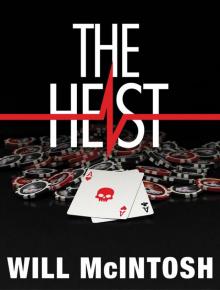 The Heist
The Heist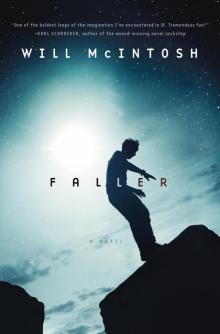 Faller
Faller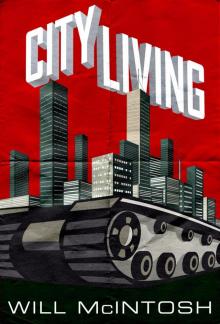 City Living
City Living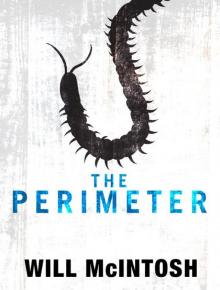 The Perimeter
The Perimeter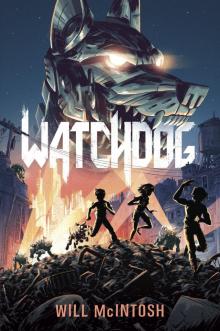 Watchdog
Watchdog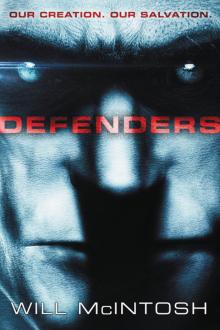 Defenders
Defenders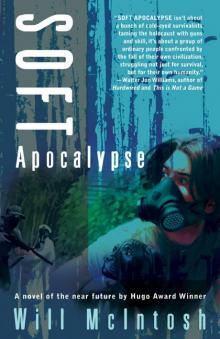 Soft Apocalypse
Soft Apocalypse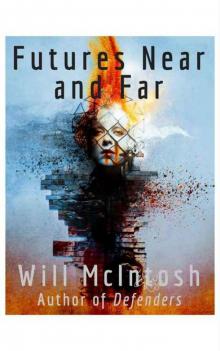 Futures Near and Far
Futures Near and Far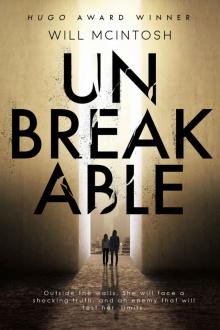 Unbreakable
Unbreakable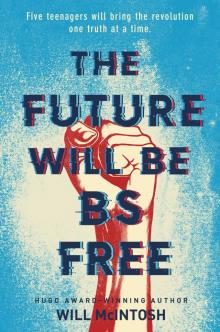 The Future Will Be BS Free
The Future Will Be BS Free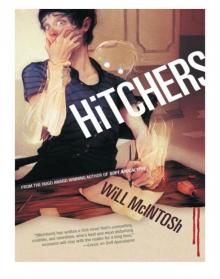 Hitchers
Hitchers Burning Midnight
Burning Midnight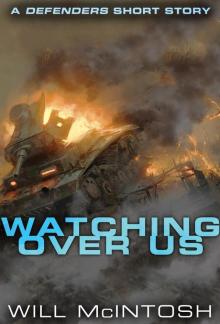 Watching Over Us
Watching Over Us